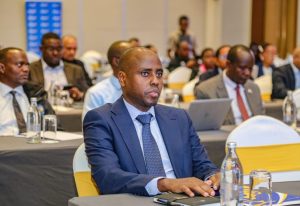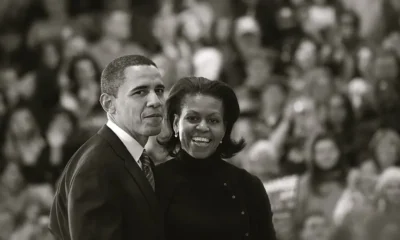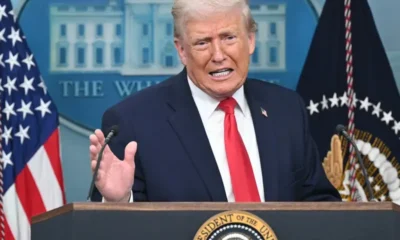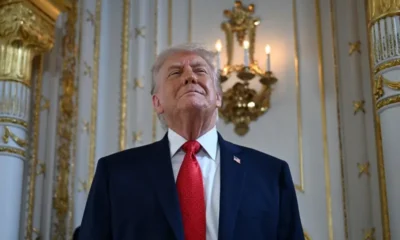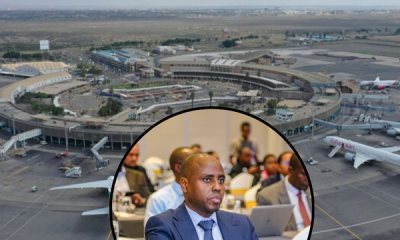News
JKIA Under Siege: US Bars Kenya Aviation Boss Over Drug, Terror Links as Trump Tightens Narcotics Noose
Kenya’s reputation as a stable aviation hub, its access to lucrative Western routes, and its broader relationship with the United States all depend on how seriously Nairobi takes this crisis.

Visa denial of KAA chief exposes widening cocaine pipeline through Nairobi as Washington escalates war on cartels. Emergency Sunday meeting called as Sh3 billion tender scandal deepens crisis
The dramatic denial of a United States visa to Kenya Airports Authority CEO Dr. Mohamud M. Gedi has thrust Jomo Kenyatta International Airport into the spotlight, exposing what American intelligence officials suspect is a compromised gateway in East Africa’s escalating narcotics war.
Aviation and Aerospace Principal Secretary Teresia Mbaika moved with unusual urgency Sunday, summoning Gedi to her office on October 12, 2025, a weekend meeting that signals the gravity of the crisis engulfing Kenya’s flagship airport.
The weekend summons, highly irregular in government protocol, has sparked speculation that Gedi may be forced out as authorities scramble to contain the diplomatic and security fallout.
“There is panic as some officials fear this may trigger changes at KAA. We are waiting to see,” a source within the ministry revealed, confirming that Mbaika was shocked by revelations surrounding the visa denial.
The refusal, issued under Section 221(g) of the Immigration and Nationality Act ahead of critical aviation security talks in Montreal, cited administrative processing but sources close to the matter point to graver concerns: suspected links to terrorism financing, procurement corruption, and facilitation of drug trafficking networks operating through Kenya’s flagship airport.
The Sh3 Billion Question
The visa denial comes as investigators examine suspicious procurement deals orchestrated under Gedi’s watch.
The acting managing director has already awarded two major tenders valued at Sh3 billion to a company linked to a sitting governor, raising red flags about conflict of interest and possible kickback schemes.
One contract alone, involving repairs at Wilson Airport, is valued at Sh1.5 billion.
Critics describe these as “hipped development projects” designed to siphon public funds while delivering little actual infrastructure improvement.
These procurement irregularities have fueled speculation that corruption at KAA extends beyond simple graft to potentially facilitating criminal enterprises that require blind eyes at strategic checkpoints. The overlap between financial malfeasance and security lapses presents a troubling picture of institutional compromise at the highest levels.
A Pipeline Exposed
The timing could not be more damning. Just weeks before Gedi’s visa application was rejected, 20 kilograms of cocaine traced back to JKIA were intercepted at London’s Heathrow Airport.
A Kenyan suspect now faces prosecution in Britain, marking the latest seizure in a disturbing pattern that has transformed the airport into a critical node in the transatlantic cocaine trade.
JKIA has increasingly featured in international drug busts that reveal sophisticated trafficking networks. In March 2025, Spanish authorities arrested two Kenyan nationals at Madrid-Barajas Airport carrying 15 kilograms of cocaine that originated from Nairobi. Investigators traced the shipment to handlers within JKIA’s cargo section.
Last December, Italian police dismantled a smuggling ring in Milan that had moved an estimated 200 kilograms of cocaine through JKIA over an 18-month period, concealed in coffee shipments and safari tour packages.
Three airport employees were arrested in Nairobi in connection with the operation.
These incidents underscore what American and European drug enforcement agencies have privately warned Kenyan authorities about for years: JKIA’s security infrastructure has been penetrated by criminal syndicates, and corrupt insiders are allegedly facilitating the flow of South American cocaine destined for European markets.
The implications for Kenya’s aviation standing are severe. The US Transportation Security Administration had scheduled the September meeting specifically to finalize the One Stop Security program, which would allow passengers transiting through JKIA to skip additional screening at American airports. That designation now hangs in the balance.
Trump’s Expanded Drug War
The visa denial aligns with President Donald Trump’s intensified campaign against international drug trafficking, which has expanded significantly since his inauguration in January 2025.
The administration has not only maintained pressure on traditional targets like Venezuela but has also turned its attention to African transit routes.
Trump’s Treasury Department recently sanctioned Venezuelan officials and entities linked to cocaine production, while the State Department has publicly called out African airports as emerging vulnerabilities in the global supply chain.
Kenya, with its strategic position and direct flights to major Western cities, has become a priority concern.
This represents a continuation of America’s long engagement in Kenya’s anti-narcotics efforts.
In 2010, the US extradited suspected drug baron Ibrahim Akasha and three others who were later convicted in New York federal court.
The Akasha brothers’ trial exposed a sprawling criminal empire that corrupted law enforcement and political figures across East Africa.
The Akasha case demonstrated Washington’s willingness to pursue extradition and prosecution of Kenyan nationals involved in narcotics trafficking. Their convictions in 2018 sent shockwaves through Kenya’s criminal underworld and political elite, revealing the depth of drug money’s penetration into legitimate institutions.
Naming Names
Kenya’s Parliament has not shied from confronting the issue. In 2019, then Interior Cabinet Secretary Fred Matiang’i publicly named several individuals suspected of drug trafficking, though prosecutions rarely followed.
MPs have repeatedly demanded investigations into how narcotics move through JKIA with apparent ease, pointing to what they describe as a protection racket involving airport officials, customs agents, and elements within security services.
Parliamentary committees have documented cases of suspected drug barons operating with impunity, protected by networks of compromised officials.
The National Assembly’s Departmental Committee on Administration and National Security has called for lifestyle audits of senior airport personnel, noting the inexplicable wealth accumulation among individuals earning modest government salaries.
The latest scandal involving Gedi adds a troubling dimension: the head of the institution responsible for airport security now faces American allegations of complicity. While no formal charges have been filed, the visa denial under provisions typically reserved for national security threats sends an unambiguous message from Washington.
Montreal Without Gedi
The visa denial was communicated ahead of a scheduled bilateral meeting between Kenyan officials and Acting TSA Administrator Ms. Ha Nguyen McNeill, held on September 25, 2025, during the 41st ICAO Assembly in Montreal. The meeting proceeded as planned, but Gedi’s conspicuous absence spoke volumes.
A letter from TSA Attaché for East and South Africa, Mr. Edwin Falcon Jr., confirmed that while the visa application was submitted with full documentation, it was refused for “additional administrative processing.” Under U.S. law, visa applicants must demonstrate full eligibility, and the burden of proof lies with the applicant under INA 291.
Sources familiar with the case indicated that Gedi’s application may have been flagged due to concerns involving national security and integrity-related issues, including suspected ties to terrorist networks, corruption in aviation procurement, and illicit narcotics activities.
The TSA meeting in Montreal covered critical security matters: finalizing agreements for the One Stop Security program, advancing a pilot to permanent transition of security protocols, US support for African nations’ integration into international aviation safety frameworks, enhancing security infrastructure at JKIA and Moi International Airport through equipment upgrades, expanding training workshops to strengthen Kenya’s aviation security capabilities, and planning a biometric study tour at Frankfurt International Airport.
American officials were diplomatic in their public statements, expressing confidence that Gedi’s absence would not hinder the goals of the meeting and emphasizing continued collaboration. But privately, sources indicate that Washington has made clear that Kenya’s aviation privileges depend on demonstrable action against the corruption and criminality that have infected its airports.
What Happens Next
Kenya’s Ministry of Transport has remained conspicuously silent beyond scheduling the emergency Sunday meeting. KAA has issued no formal statement, and Gedi, while confirming the incident, said the move came as a surprise.
The institutional paralysis speaks volumes about the sensitivity of the matter and the potential legal and diplomatic ramifications.
For JKIA, the path forward requires more than statements of concern.
International aviation authorities are watching closely to see whether Kenya will conduct genuine investigations, remove compromised officials, and implement the security protocols that Western partners have demanded.
The stakes extend beyond one man’s visa.
Kenya’s reputation as a stable aviation hub, its access to lucrative Western routes, and its broader relationship with the United States all depend on how seriously Nairobi takes this crisis.
As President Trump escalates his administration’s war on narcotics trafficking, countries that serve as transit points face a stark choice: clean house or face isolation.
For Kenya, that reckoning has arrived at 30,000 feet. The emergency Sunday meeting between Mbaika and Gedi may well determine whether JKIA can salvage its international standing or whether this scandal marks the beginning of Kenya’s aviation isolation.
Kenya Insights allows guest blogging, if you want to be published on Kenya’s most authoritative and accurate blog, have an expose, news TIPS, story angles, human interest stories, drop us an email on [email protected] or via Telegram
-

 Grapevine1 day ago
Grapevine1 day agoAlleged Male Lover Claims His Life Is in Danger, Leaks Screenshots and Private Videos Linking SportPesa CEO Ronald Karauri
-

 Lifestyle4 days ago
Lifestyle4 days agoThe General’s Fall: From Barracks To Bankruptcy As Illness Ravages Karangi’s Memory And Empire
-

 Americas1 week ago
Americas1 week agoEpstein Files: Bill Clinton and George Bush Accused Of Raping A Boy In A Yacht Of ‘Ritualistic Sacrifice’
-

 Business2 weeks ago
Business2 weeks agoCooking Fuel Firm Koko Collapses After Govt Blocks Sh23bn Carbon Deal
-

 Business1 week ago
Business1 week agoABSA BANK IN CRISIS: How Internal Rot and Client Betrayals Have Exposed Kenya’s Banking Giant
-

 Investigations6 days ago
Investigations6 days agoEpstein Files: Sultan bin Sulayem Bragged on His Closeness to President Uhuru Then His Firm DP World Controversially Won Port Construction in Kenya, Tanzania
-

 Business1 week ago
Business1 week agoKRA Can Now Tax Unexplained Bank Deposits
-

 News1 week ago
News1 week agoAUDIT EXPOSES INEQUALITY IN STAREHE SCHOOLS: PARENTS BLED DRY AS FEES HIT Sh300,000 AGAINST Sh67,244 CAP

